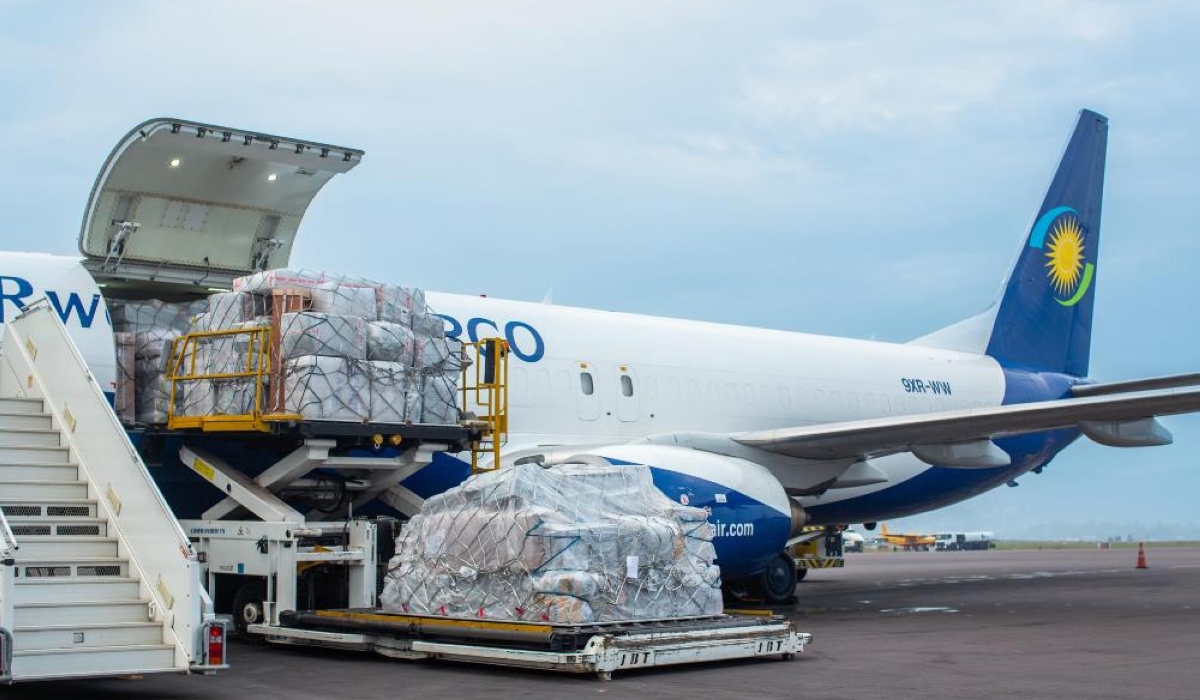Inzicht in het huidige landschap
De toegenomen vraag naar tuinbouwexport heeft de aandacht gevestigd op de beperkingen van de bestaande luchtvrachtcapaciteiten. Recente rapporten wijzen op een significante toename van de vrachtvolumes die door de nationale luchtvaartmaatschappij RwandAir worden afgehandeld. In 2024 steeg het vrachtvolume met een indrukwekkende 33 procent, klimmend vanuit 4.595 ton in 2023 naar 6.113 ton. Deze toename in cargovolume weerspiegelt de bloeiende tuinbouwsector, een sector die steeds belangrijker wordt op de wereldmarkten.
Uitdagingen voor exporteurs van tuinbouwproducten
De minister van Infrastructuur, Jimmy Gasore, benadrukte de noodzaak om logistieke hindernissen aan te pakken die voortkomen uit de beperkte vrachtcapaciteit van RwandAir, met name voor exporteurs in de tuinbouwsector. Deze noodzaak werd benadrukt tijdens een bezoek van premier Justin Nsengiyumva aan de Gabiro Agribusiness Hub in het Nyagatare District.
De Gabiro Agribusiness Hub staat op het punt om te omvatten 15.600 hectaremet 5.600 hectare al klaar voor gebruik. Dit initiatief onderstreept de toewijding van de overheid om de voedselzekerheid te versterken, de economische ontwikkeling te bevorderen en banen te creëren. Verschillende bedrijven die in verschillende landbouwketens in Gabiro werken, zoals Kinvest, uitten echter hun bezorgdheid over de beperkte luchtvrachtcapaciteit, die hun vermogen om producten effectief te exporteren beïnvloedt.
Groei stimuleren in de tuinbouwsector
Kinvest loopt voorop in de tuinbouwproductie en verbouwt gewassen zoals sperziebonen, passievruchten en Hass-avocado's, die naar verwachting binnen slechts drie jaar klaar zijn voor de oogst. Het bedrijf produceert momenteel 500 ton aan fruit en groente per maand, een volume dat de huidige vrachttransportcapaciteit van RwandAir uitdaagt.
Uitbreiding van de luchtvrachtcapaciteit
Jesse Ratichek, Managing Partner van Kinvest, wees op de discrepantie tussen productieschalen en de capaciteit van luchttransport. Hij benadrukte de noodzaak van aanzienlijke uitbreidingen van de vrachtcapaciteit om grootschalige tuinbouwbedrijven in staat te stellen grote internationale markten te betreden. Deze toename zal producenten niet alleen helpen te voldoen aan de eisen van veeleisende klanten, maar ook de winstgevendheid in de hele toeleveringsketen vergroten.
Deze behoefte nodigt uit tot een diepgaandere discussie over het investeren in grotere luchtvrachttoestellen die in staat zijn om producten rechtstreeks naar internationale markten zoals Europa en het VK te vervoeren. Ratichek merkte op dat de invoering van wide-body luchtvrachttoestellen nationale problemen zou kunnen oplossen, waardoor er versere producten kunnen worden geleverd en tegelijkertijd de exportvolumes kunnen worden vergroot.
De nadruk op verbeterde logistiek
Om deze logistieke uitdagingen aan te pakken, noemde Ratichek de verschuiving van Kinvest naar het verbeteren van de post-harvest activiteiten, waaronder oplossingen zoals koelsystemen op basis van houtskool en energiezuinige koelopslag. Deze innovaties zouden de supply chain kunnen stroomlijnen en de houdbaarheid van producten die overzee worden verzonden, kunnen verlengen.
Momenteel worden verse producten direct in koelwagens geladen en naar Kigali gebracht om te worden verpakt, voordat ze met behulp van luchtvaartmaatschappijen zoals RwandAir en Ethiopian Airlines de internationale markten bereiken. De keuze van transport heeft een aanzienlijke invloed op de productkwaliteit, waarbij de rechtstreekse vluchten van RwandAir over het algemeen betere resultaten opleveren dan vluchten met tussenstops, die leiden tot temperatuurschommelingen die kunnen leiden tot hogere afkeuringspercentages bij klanten.
Infrastructuur stimuleren voor toekomstige groei
Het aanpakken van deze dringende uitdagingen is cruciaal voor de toekomst van de tuinbouwexportsector. Minister Gasore merkte op dat de situatie een ‘goed probleem’ is om te hebben, omdat het een hoge vraag weerspiegelt die operationele aanpassingen noodzakelijk maakt. De groeiprognoses voor RwandAir, ondersteund door hun toename in speciale vrachtvliegtuigen en de frequentie van de dienstverlening, benadrukken de voortdurende inspanningen om deze logistieke knelpunten te verlichten.
| Jaar | Cargo Volume (tonnes) |
|---|---|
| 2023 | 4,595 |
| 2024 | 6,113 |
Navigeren door toekomstige trends in de export van de tuinbouw
Toen de tuinbouwexport floreerde, waardoor een nettowaarde ontstond van meer dan $75 miljoen in 2023/2024— een indrukwekkende stijging van 29,1 procent vergeleken met het voorgaande jaar bereidt Rwanda zich voor op een nog drukkere toekomst. Prognoses geven aan dat er de komende jaren een sterke stijging van de avocado-productie wordt verwacht, wat de urgentie benadrukt voor luchtvaartmaatschappijen zoals RwandAir om hun vrachtvloot dienovereenkomstig aan te passen en uit te breiden.
Conclusie: Cargo Transport en Tuinbouwgroei op elkaar afstemmen
De groeiende vraag naar tuinbouwproducten plaatst de noodzaak voor uitgebreide luchtvrachtcapaciteiten in de schijnwerpers. Het laat zien dat, hoewel het verbeteren van de luchttransportlogistiek ontmoedigend lijkt, het cruciaal is om het volledige potentieel van de sector te benutten. GetTransport.com staat klaar om te helpen met betrouwbare, betaalbare logistieke oplossingen om een vlotte, efficiënte vrachttransport wereldwijd te garanderen, of het nu gaat om verhuizingen van huis of kantoor, of om de levering van oversized of omvangrijke goederen. Dit platform is ontworpen om aan uiteenlopende transportbehoeften te voldoen, waardoor bedrijven en exporteurs in staat worden gesteld om uit te blinken in de huidige competitieve markt.
Al met al vormen de groeiende exportmarkt voor de tuinbouw en de bijbehorende logistieke uitdagingen zowel hindernissen als kansen. Hoewel beoordelingen en inzichten een schat aan informatie bieden, gaat er niets boven persoonlijke ervaring. Profiteer van de scherpe tarieven van GetTransport.com en navigeer door de complexiteit van het transport van goederen zonder de bank te breken. Duik in de ervaring en Ontvang de beste aanbiedingen nu!

 Groeiende vraag naar capaciteit voor luchtvracht in de tuinbouwexport">
Groeiende vraag naar capaciteit voor luchtvracht in de tuinbouwexport">